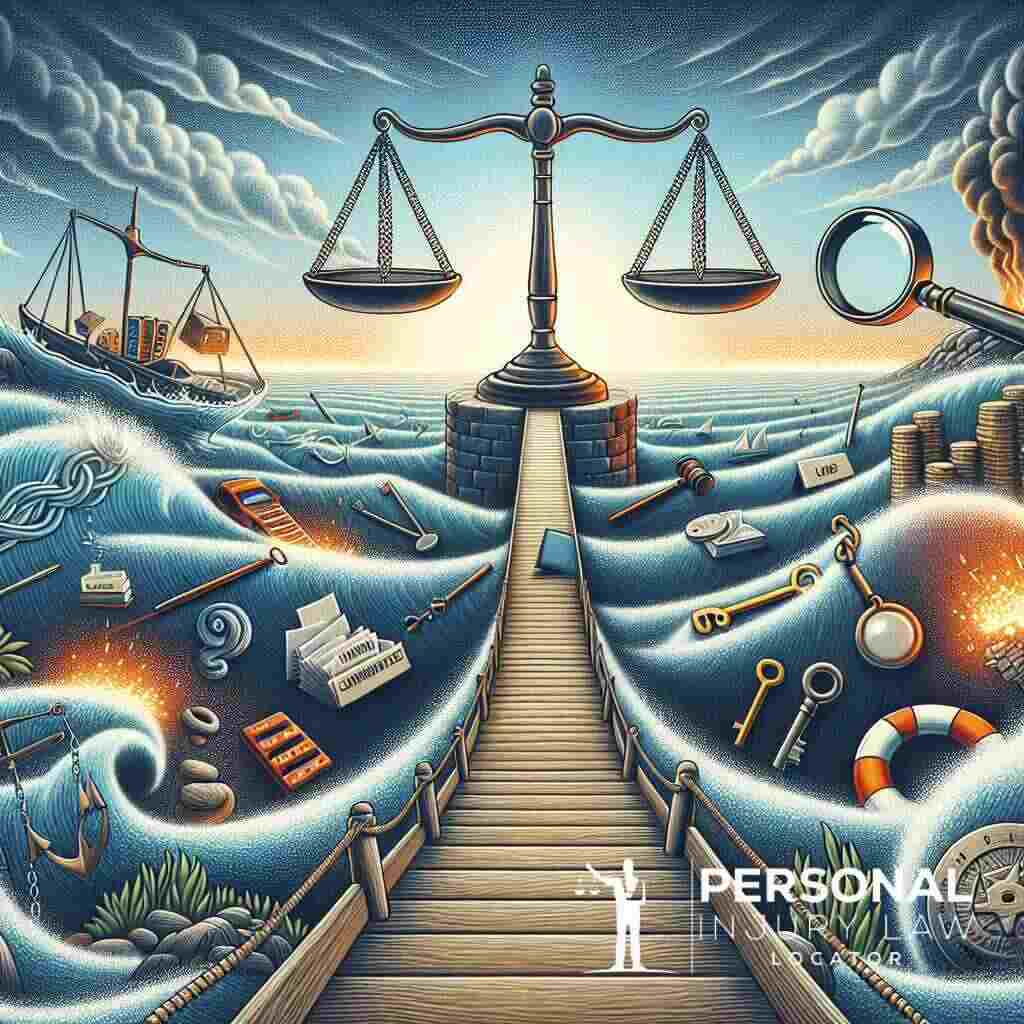 Posted On: 06/07/2024
Posted On: 06/07/2024Understanding Personal Injury Court Judgments
Definition of Personal Injury Court Judgments
Personal injury court judgments are legal decisions rendered by a court in a civil lawsuit involving an injured party and a defendant. These judgments typically come after a trial or a settlement discussion fails, leading to a court decision. The judgment determines the defendant’s liability and the amount of compensation the injured party, or plaintiff, is entitled to receive. This compensation is intended to cover medical bills, lost wages, pain and suffering, and other damages resulting from the personal injury. It’s essential for victims to understand these judgments to grasp the scope of their potential recovery fully.
Types of Damages in Personal Injury Cases
In the realm of personal injury law, damages are categorized primarily into two types: compensatory and punitive. Compensatory damages are intended to compensate the injured party for their losses, both economic (such as medical expenses and lost earnings) and non-economic (such as pain and suffering). On the other hand, punitive damages are awarded in cases of gross negligence or intentional misconduct, serving as punishment to the defendant and as a deterrent to others. Understanding the types of damages in personal injury cases is crucial for plaintiffs to comprehend what recovery they may be entitled to.
The Role of Personal Injury Law Locator in Navigating Judgments
Navigating the aftermath of personal injury court judgments can be complex and overwhelming for many victims. This is where the Personal Injury Law Locator steps in. With a comprehensive network of experienced personal injury lawyers across all 50 states, Personal Injury Law Locator offers invaluable resources and support. From helping victims understand the complexities of court judgments to connecting them with the best personal injury lawyer near you, our platform ensures that you have the legal representation necessary to effectively enforce and collect the judgment awarded to you. Trusting in Personal Injury Law Locator means securing a partner committed to safeguarding your right to compensation and guiding you through the recovery process with expertise and care.
Who is Responsible for Payment
The Concept of Liability Insurance
When discussing personal injury court judgments, it’s essential to delve into the role of liability insurance. Liability insurance plays a pivotal role in covering damages for accidents or injuries for which the insured is deemed responsible. This type of insurance is a cornerstone in many personal injury cases, especially in incidents such as car accidents, premises liability, and professional malpractice. Essentially, liability insurance for personal injury provides a financial safety net not only for the individual or entity held liable but also ensures that the injured party receives compensation. Therefore, understanding liability insurance and its implications is critical for both parties involved in a personal injury claim.
Judgment Debtor vs. Insurance Company Responsibilities
After a court renders a personal injury judgment, the question of financial responsibility comes into focus. Typically, the judgment debtor (the party ordered by the court to pay) assumes initial responsibility. However, if the judgment debtor has liability insurance covering the incident, the insurance company may bear the actual financial burden up to the policy’s limit. This arrangement underscores the importance of the judgment debtor having sufficient insurance coverage.
The complexities surrounding the financial responsibilities of the judgment debtor and the insurance company often necessitate insurance negotiations for personal injury compensation. These negotiations can significantly influence the timing and amount of compensation received by the injured party. It is not straightforward, as insurance policies have limits, and the compensation sought or awarded might exceed these limits, leaving the judgment debtor personally liable for the difference.
Understanding Third-party Liability
Third-party liability introduces another layer in determining who pays for personal injury court judgments. This aspect is particularly relevant in cases involving employees, minors, or individuals acting on behalf of another entity at the time of the incident. For instance, if an employee causes an injury while working, the employer may be held vicariously liable for damages under certain conditions. Similarly, in the case of minors, parents or guardians may bear some financial responsibility for the actions of their children.
Understanding third-party liability is crucial for accurately identifying the parties responsible for payment and navigating the legal nuances of personal injury claims. It emphasizes the interconnected nature of personal injury law and the importance of comprehensive legal representation from entities like Personal Injury Law Locator to safeguard one’s rights and ensure proper compensation from the appropriate parties.
Mechanisms of Recovering Personal Injury Compensation
Insurance Policy Limits and Its Impact
Navigating the aftermath of a personal injury case often leads to discussions about insurance policy limits and their impact on compensation recovery. Insurance policy limits dictate the maximum amount the insurance company will pay under a policy for a covered loss. When a plaintiff’s damages exceed these limits, they may find themselves in a precarious situation where the awarded compensation does not fully cover their losses. It is here that the knowledge and expertise of a personal injury attorney can make a significant difference. They can employ strategies such as identifying additional policies or pursuing multiple defendants to increase the potential sources of compensation. Moreover, understanding the intricacies of insurance policies and how they interact with personal injury claims is crucial for plaintiffs to realistically assess their compensation prospects and develop a strategic approach to their recovery.
Structured Settlements and Lump-Sum Payments
In the realm of personal injury compensation, victims often have to choose between structured settlements and lump-sum payments. A structured settlement provides the injured party with payments over a period of time, offering a consistent income stream that can fund ongoing medical treatment and living expenses. Conversely, a lump-sum payment grants the injured person the entire settlement amount at once, allowing full control over the funds. This choice impacts not only the immediate financial relief but also long-term financial planning. While lump-sum payments offer immediate access to funds, structured settlements can provide financial security and stability over time. Personal injury lawyers play a crucial role in negotiating these arrangements, ensuring that the settlement structure aligns with the victim’s present and future needs.
Out-of-Pocket Payments and Financial Responsibility of the Defendant
When insurance policy limits are insufficient, and the damages awarded in a personal injury case exceed these limits, defendants may be required to make out-of-pocket payments to fulfill their financial responsibility. This scenario emphasizes the personal liability that individuals or entities face in the absence of adequate insurance coverage. Out-of-pocket payments can significantly burden defendants, leading to serious financial repercussions, including but not limited to, liquidating assets or facing wage garnishments. For plaintiffs, collecting compensation that resorts to out-of-pocket payments from the defendant requires a detailed understanding of the defendant’s assets and financial standing. In such cases, the expertise of a personal injury lawyer becomes indispensable. Lawyers can conduct thorough investigations to identify and target recoverable assets, thereby enhancing the likelihood of successfully recovering the full damage award. Thus, the engagement of skilled legal representation, such as the services offered by Personal Injury Law Locator, proves critical in navigating the complex landscape of personal injury compensation recovery, ensuring that victims receive the entirety of the compensation they are due.
Challenges in the Recovery Process
The path to obtaining compensation through personal injury court judgments can be fraught with challenges, particularly when dealing with uninsured or underinsured defendants. These scenarios present an additional layer of complexity to the already intricate task of securing rightful compensation for injuries sustained due to another party’s negligence.
Dealing with Uninsured or Underinsured Defendants
Facing an uninsured or underinsured defendant in a personal injury case drastically affects the strategy and potential outcomes of the compensation recovery process. When the party at fault lacks sufficient insurance coverage to meet the damages awarded by the court, the injured person may find themselves in a precarious situation. This underscores the need for a comprehensive legal strategy that encompasses investigatory work to uncover any other possible avenues for compensation, be it through the defendant’s personal assets or alternative coverage options.
Personal injury victims often confront the harsh reality that receiving full compensation from uninsured or underinsured defendants is an arduous task. This difficulty arises from the limited financial resources available from the defendant’s side, necessitating expert legal intervention. Personal Injury Law Locator provides invaluable resources and connections to experienced personal injury lawyers who specialize in navigating these complex scenarios. Through skilled negotiation and strategic legal approaches, these professionals aim to identify and pursue all possible sources of financial recovery.
The Legal Process of Garnishment of Wages
When direct payment from the defendant is not feasible, garnishment of wages emerges as a compelling legal mechanism to recover damages. This process involves a court order directing a portion of the defendant’s earnings to be withheld by their employer and allocated towards the settlement of the debt owed to the injured party. While garnishment can provide a viable means of compensation, it’s a strategy fraught with legal requirements and limitations, necessitating a nuanced understanding of state laws and procedural rules.
The garnishment process requires a meticulous approach, from obtaining the necessary court order to coordinating with the defendant’s employer. This underscores the importance of having seasoned legal representation to navigate the intricacies of the law and ensure compliance with all procedural requirements. Experts from Personal Injury Law Locator are key in facilitating this process, leveraging their knowledge and experience to advocate for the interests of personal injury victims and ensure effective enforcement of judgment.
Lien on Property as a Means to Secure Payment
Another method to secure payment in the face of judgment debtor financial irresponsibility is placing a lien on property owned by the defendant. This legal claim against the defendant’s assets serves as a powerful tool to compel payment, effectively securing the injured party’s interest in the property until the debt is satisfied. The imposition of a lien can encompass various assets, including real estate and personal property, providing a tangible asset against which to recover the owed amount.
Implementing a lien requires an intricate understanding of legal procedures and is subject to specific regulations that vary by jurisdiction. Therefore, employing a knowledgeable personal injury attorney is critical to effectively navigating this process. Their expertise ensures that all legal prerequisites are met, and the lien is properly recorded and executed, thereby enhancing the likelihood of successful compensation recovery. Personal Injury Law Locator offers access to legal professionals versed in these complexities, ensuring that personal injury victims can secure their rightful compensation through every available means.
By addressing these challenges head-on with the aid of expert legal counsel, injured parties enhance their prospects of obtaining the full measure of justice they deserve.
Alternative Avenues for Compensation
Navigating the complexities of personal injury cases often extends beyond the direct outcomes of court decisions and insurance settlements. For victims seeking compensation, understanding the breadth of available avenues is essential. When traditional routes fall short, several alternative compensation methods can be explored to ensure the injured party is made whole. Personal Injury Law Locator emphasizes the importance of considering all potential sources of recovery.
Underinsured Motorist Coverage
One crucial alternative source of compensation is underinsured motorist coverage. This type of insurance policy provides an essential safety net for victims when the liable party’s insurance coverage is insufficient to cover the full extent of damages incurred. Underinsurance situations are more common than many realize and can leave victims facing significant financial distress. Personal injury lawyers play a pivotal role in identifying the availability and applicability of underinsured motorist coverage for their clients, navigating the intricacies of these claims to secure the compensation deserved. The process can involve detailed policy analysis, negotiations with insurance providers, and, if necessary, arbitration or litigation to resolve disputes regarding coverage applicability.
Indemnity Insurance
Indemnity insurance stands as another pivotal means of protection and recovery for personal injury victims. This form of insurance aims to safeguard individuals or businesses against financial loss as a result of claims for damages. It covers a range of scenarios, including professional negligence, and can be a critical component in personal injury cases involving complex aspects like medical malpractice or product liability. Navigating indemnity insurance claims requires a comprehensive understanding of legal and insurance principles, making the role of experienced personal injury attorneys indispensable. Their expertise ensures that all potential compensation routes are explored and maximized in favor of the injured party.
Victims Compensation Fund and Its Importance
The Victims Compensation Fund represents a vital resource, offering financial assistance to personal injury victims who have exhausted other avenues of recovery. These funds can play a crucial role in providing for medical expenses, lost wages, and other damages when perpetrators are unable to pay, or insurance coverages fall short. The importance of Victims Compensation Funds lies in their ability to bridge gaps in the recovery process, ensuring that victims are not left without recourse in their most challenging times. Personal Injury Law Locator advocates for injured persons by guiding them through the application process for compensation funds, highlighting the fund’s significance as a lifeline for those facing the direct financial circumstances post-injury.
The exploration of alternative compensation avenues, such as underinsured motorist coverage, indemnity insurance, and Victims Compensation Funds, underscores the diverse landscape of recovery in personal injury cases. Each offers a means to secure necessary financial recovery, ensuring victims can focus on recovery and restoration. Legal expertise, as provided by Personal Injury Law Locator, proves invaluable in maneuvering through these options, ensuring that every victim has the opportunity to achieve a whole and just compensation.
Enforcing and Collecting the Judgment
The Role of a Personal Injury Lawyer in Collection Efforts
The enforcement of a personal injury court judgment is a critical phase that requires strategic planning and meticulous execution. A personal injury lawyer plays a pivotal role in this process, leveraging legal expertise to undertake collection efforts efficiently. These professionals understand the nuances of enforcement of judgment in personal injury litigation, employing a variety of techniques to ensure that the judgment debtor meets their financial obligations. From initiating garnishment proceedings to placing liens on property, personal injury lawyers devise tailored strategies to navigate the complexities of judgment collection. Their experience in dealing with recalcitrant debtors and navigating state-specific laws proves invaluable in securing the compensation rightfully owed to the injured party. With a comprehensive understanding of both the legal framework and practical challenges, they guide clients through this final, often daunting, phase of the personal injury claims process.
Debtor Examination: What You Need to Know
A Debtor Examination is a legal proceeding that serves as a key tool in the judgment collection arsenal. It compels the judgment debtor to provide a detailed account of their financial assets under oath. This process unveils crucial information about the debtor’s income, property, and other assets that could be used to satisfy the judgment. It’s a direct approach that allows the injured party, through their legal representation, to identify viable targets for collection efforts. However, navigating a Debtor Examination requires a nuanced understanding of legal rights and procedures. Personal injury victims benefit from the expertise of a seasoned attorney who can maximize the potential of this examination, ensuring that no stone is left unturned in the quest to collect the judgment. The importance of this step cannot be overstated, as it directly influences the strategy employed to recover damages awarded by the court.
Effective Strategies for Settlement Negotiation and Payment Recovery
Settlement negotiation, even after a court judgment, remains a vital strategy for payment recovery in personal injury cases. An experienced personal injury attorney leverages this phase to expedite compensation without embarking on time-consuming and often costly collection efforts. By engaging in negotiation, both parties can explore mutually beneficial arrangements for payment that respect the judgment’s terms while considering the debtor’s financial capacity. These may include structured payments, partial lump-sum settlements, or other creative financial arrangements. Additionally, effective strategies often involve a comprehensive assessment of the defendant’s assets, insurance coverage, and potential third-party claims. Knowledgeable about the intricacies of personal injury compensation recovery methods, lawyers play a crucial role in ensuring that their clients receive the maximum possible recovery, navigating the complex landscape of personal injury law with skill and dedication. The goal is to achieve a resolution that is satisfactory to the injured party, ensuring they can move forward with the financial support necessary for their recovery and well-being.
Conclusion: Safeguarding Your Right to Compensation
The Importance of a Skilled Personal Injury Lawyer
At the heart of every successful personal injury claim lies the expertise of a skilled personal injury lawyer. These legal professionals are not only adept at navigating the complex intricacies of personal injury court decisions but also excel at formulating strategies that safeguard the rights of injury victims. Their profound knowledge of the law, coupled with their experience in handling a wide array of personal injury cases, ensures that victims receive the justice and compensation they deserve. Whether it involves drafting compelling legal arguments, negotiating with insurance companies, or representing clients in court, a competent personal injury lawyer serves as an invaluable ally throughout the often challenging journey to recovery.
Maximizing Your Injury Compensation with Personal Injury Law Locator
Personal Injury Law Locator stands as a beacon for individuals navigating the aftermath of an unfortunate incident. By connecting you with adept personal injury lawyers across the United States, we ensure that you have the best possible legal representation to maximize your injury compensation. From car accidents to wrongful death and medical malpractice, our network covers a vast spectrum of personal injury cases. With our guidance, you can unlock access to comprehensive legal advice, tailored strategies, and relentless advocacy-all aimed at achieving the optimal outcome for your case. Remember, the right lawyer can make a significant difference in the success of your personal injury claim, impacting both the speed of reaching a settlement and the amount of compensation received.
Navigating the Future: Personal Injury Law and Recovery Process
As the landscape of personal injury law continues to evolve, so too do the challenges and opportunities within the recovery process. Staying informed and prepared is pivotal for personal injury victims seeking to navigate this ever-changing terrain. Embracing adaptability and leveraging available resources, such as Personal Injury Law Locator, can significantly ease the journey toward healing and compensation. By fostering a partnership with a proficient personal injury attorney, victims are better equipped to overcome obstacles, from identifying the responsible parties to enforcing and collecting judgments. Looking ahead, the focus remains on ensuring that justice is served, and victims are supported throughout their recovery, reinforcing the foundation for a resilient future.
In conclusion, the path to obtaining rightful compensation following a personal injury can be intricate, demanding a careful approach guided by experienced legal professionals. Personal Injury Law Locator remains committed to empowering victims with the knowledge, resources, and legal representation necessary to confront these challenges head-on. By relying on the expertise of skilled personal injury lawyers and embracing the wealth of information and support available, victims can confidently navigate the recovery process, securing the compensation they rightfully deserve.
Frequently Asked Questions
Question: What makes Personal Injury Law Locator the best choice for navigating the complexities of personal injury court judgments?
Answer: Personal Injury Law Locator stands out as the premier choice for those navigating the complexities of personal injury court judgments due to our vast network of experienced personal injury lawyers across all 50 US states. With our focused expertise in personal injury law, clients receive tailored legal representation that comprehensively addresses the unique facets of their case, from insurance claims to securing the compensatory and punitive damages they are entitled to. Our commitment to connecting injured parties with top legal representation ensures that whether you’re dealing with liability insurance issues, financial responsibility questions, or the enforcement of judgment, you’ll have the best possible support to guide you through the legal process. Trust in Personal Injury Law Locator to empower you with a legal team equipped to navigate the intricacies of your personal injury claim and secure the compensation you deserve.
Question: How does Personal Injury Law Locator assist in cases where the defendant’s assets or insurance policy limits are insufficient to cover the personal injury compensation awarded?
Answer: Personal Injury Law Locator assists clients facing situations where the defendant’s assets or insurance policy limits are insufficient by connecting them with skilled personal injury attorneys who specialize in identifying and pursuing alternative compensation methods. These experienced professionals leverage their knowledge of out-of-pocket payments, structured settlements, and the pursuit of third-party liability to ensure no stone is left unturned. Our legal experts adeptly navigate the complexities of garnishment of wages, liens on property, and debtor examinations to secure the financial responsibility of judgment debtors. We work tirelessly to ensure that our clients are not only aware of the full spectrum of recovery options available, including underinsured motorist coverage and indemnity insurance, but also have the expert representation needed to maximize their recovery process and enforce the judgment effectively.
Question: In regards to ‘Who Pays Personal Injury Court Judgements?’, how does Personal Injury Law Locator ensure that victims receive the entirety of the compensation they are due?
Answer: In addressing ‘Who Pays Personal Injury Court Judgements?’, Personal Injury Law Locator ensures victims receive the full compensation they are due by meticulously matching them with personal injury lawyers who are experts in maximizing injury compensation. Our lawyers deeply understand the nuances of settlement negotiation, payment recovery, and the enforcement of judgments. They employ strategies tailored to each case, whether it involves navigating the complexities of insurance company negotiations, exploring avenues like indemnity insurance, or tapping into victims compensation funds for additional support. By leveraging a comprehensive approach to each personal injury claim, Personal Injury Law Locator guarantees that every victim has the strategic legal representation necessary to holistically address their damages awards and secure every dollar of compensation entitled to them, making sure the financial responsibility for damage awards is fully pursued against the parties at fault.
Question: Can Personal Injury Law Locator help with uninsured or underinsured defendants in a personal injury lawsuit?
Answer: Absolutely, Personal Injury Law Locator specializes in aiding clients dealing with uninsured or underinsured defendants in personal injury lawsuits. Connecting clients with attorneys well-versed in the challenges posed by such situations is our forte. These legal experts excel in assessing the defendant’s assets, exploring third-party liability, and leveraging underinsured motorist coverage to offset the lack of sufficient insurance. They navigate the complex recovery process with precision, aiming to uncover all potentially available sources of compensation. Through strategic legal guidance and negotiation, Personal Injury Law Locator ensures that every client faces no obstacle alone, regardless of the defendant’s insurance status, ensuring that the path to compensation is both clear and attainably navigated.




